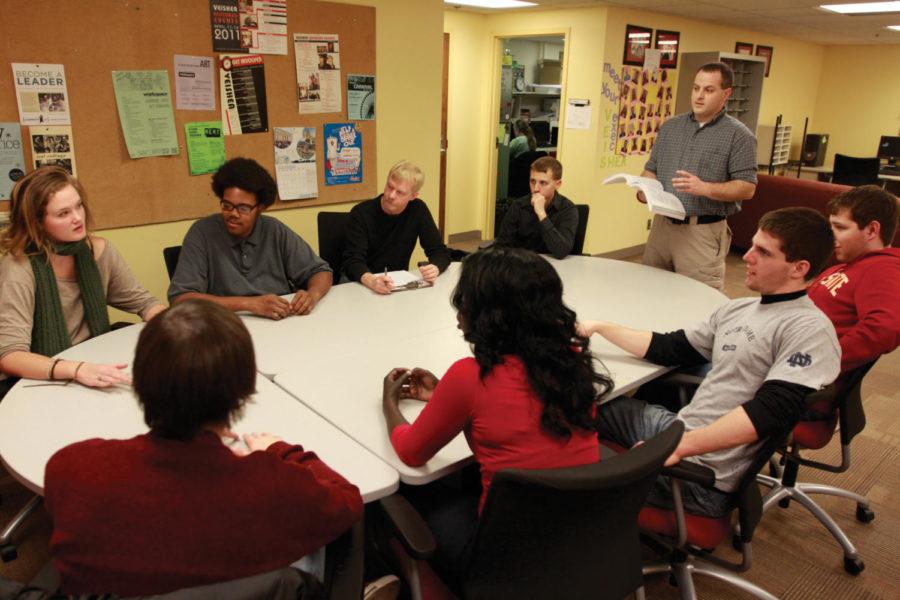Snell: Acting in a time of inaction
Photo: Huiling Wu/Iowa State Daily
The ISU Ambassadors meet to discuss their bill proposal on Tuesday, Jan. 24, at the West Student Office of the Memorial Union.
January 25, 2012
Quiz a dozen different people about what they think politics is and you’re likely to get a dozen different answers, though all almost certainly with at least some degree of cynicism.
Politics these days is a love-hate sort of thing — you either love it or you hate it. A lot is said about politics in this paper, by myself included, and I’m sure it gets old if you’re in the “hate it” category. But what we can all probably agree on is that something is completely broken with how we do politics. It’s probably also true that most of us aren’t exactly sure what it is either.
As a returning student a few years older than the average student here, I’ve had a great deal of experiences that many of you have not. Between the time I was here the first time and now, I’ve seen and done things that have altered my fundamental outlook on the world. My interests have been piqued, developed and worn smoother by the abrasive daily grind of life.
Like most, I too was like Neo from “The Matrix” when it came to politics, feeling instinctively that something was amiss with the world but unable to identify what it was. It’s an individual problem, a social problem and a public problem. It’s a problem with so many facets that we can’t simply point and say, “Aha, there it is!”
We focus so much on our tomorrows that we tend to ignore our yesterdays. In trying to discover the pervasive disease afflicting American political interaction today, I turned rearward in time. Most investigations into American politics start in the colonial era, and indeed that’s where I started. Then I went a hundred years before that to reveal how the founders came to believe what they did.
But still that wasn’t far enough. Eventually, I stumbled upon the ancient Greeks, who had this notion of politics that was very different than what we consider politics today. Nearly 3,000 years ago, there were no polls, no talking heads telling us what the politician we just listened to said. There were no Twitter questions from the viewer audience, no TV ads, no nothing.
A little pondering on this raises an important question: If the Greeks were the originators of Western political thought, then without all the nonsense we call politics now, just what the heck did the ancient Greeks do to be political?
That’s another column for another day.
But I will say for now that sitting at home and complaining about government is not political. Liking candidates on Facebook is not political. Registering to vote as a Republican or Democrat is not political. Watching canned pseudo-debates on Fox News is not political. Writing a rude email to your congressman is not political. Waving signs in front of some building somewhere is not political.
What I can tell you today about politics is that it involves action. Action, as part of that Greek philosophy I’ll write about someday, is to politics what air is to fire: One cannot exist without the other. Politics is about the doing of something. You’ve no doubt read that in this paper before, and what that something is certainly is debatable.
However, I think I’ve found a group of people who are at least trying to discover the old-school notion of action and politics, even if they don’t know that’s what they’re doing.
I am but one cog in a wheel called the ISU Ambassadors. The Ambassadors are a branch of the Government of the Student Body whose job is engaging the Iowa Legislature regarding issues important to ISU students and students from the other two Iowa regent universities. We work with ISU students to identify our common problems and needs, and we do our best to communicate them to your representatives in Des Moines.
Over the course of the last few months, we have developed a piece of legislation — the first ever of its kind — designed to address some of the problems students face, namely crippling levels of tuition and debt. It has been accepted for sponsorship by two representatives and will be voted on later this year.
It will be my pleasure to present this bill to GSB on behalf of the Ambassadors next Wednesday, and thus to you, my fellow students, at the weekly GSB meeting at 7 p.m. in the Campanile Room of the Memorial Union.
Please come to the MU to meet me, as well as the other Ambassadors who will be attending, and discuss this groundbreaking bill proposal. The process is just beginning, unending and our success uncertain, but I want you to come be a part of it — to come help us help you.
The Ambassadors are also holding a fun and informal debate this Wednesday about the government’s role in sex education in schools and some pending legislation that affects you. That starts at 7 p.m. in the Gold Room of the Memorial Union. Come join us for the discussion.
As always, my email inbox is open.










